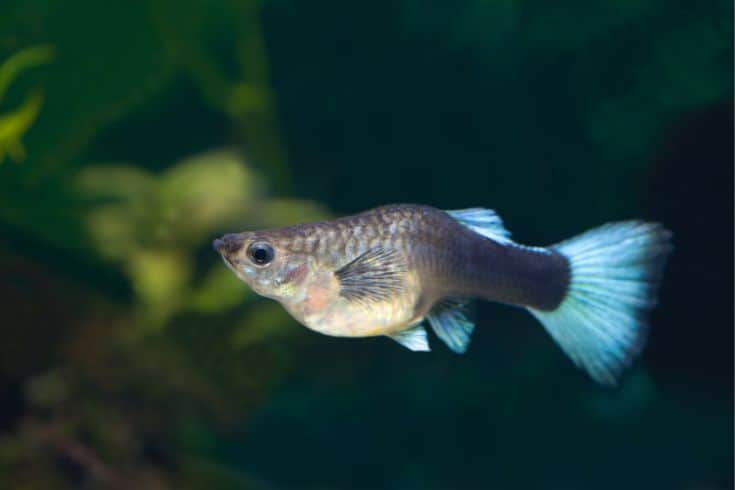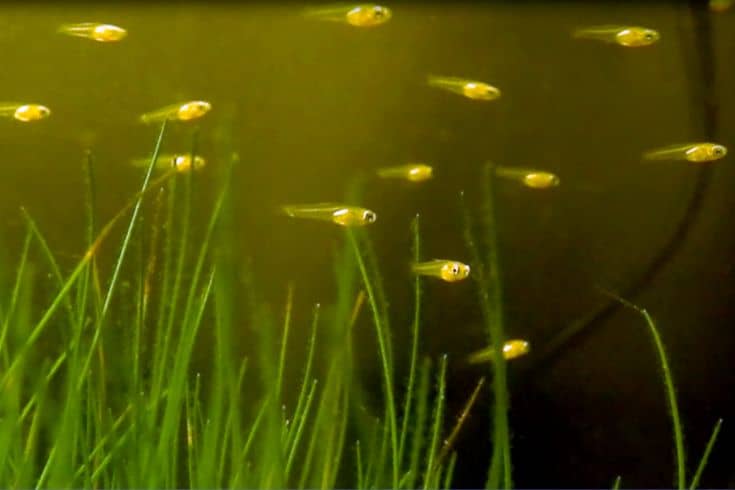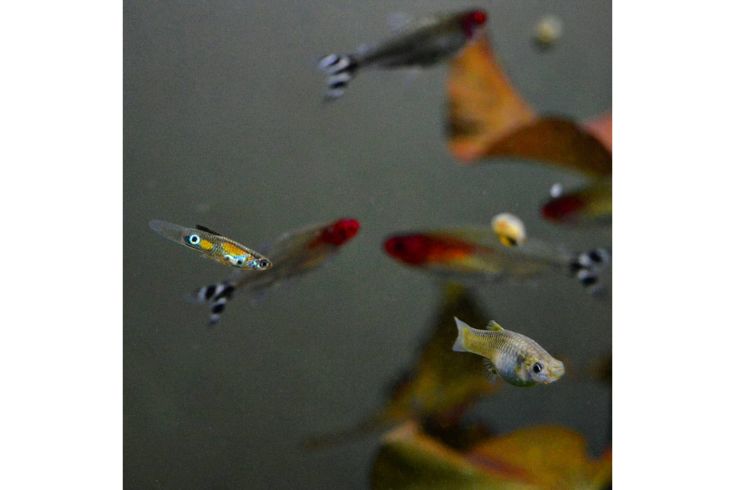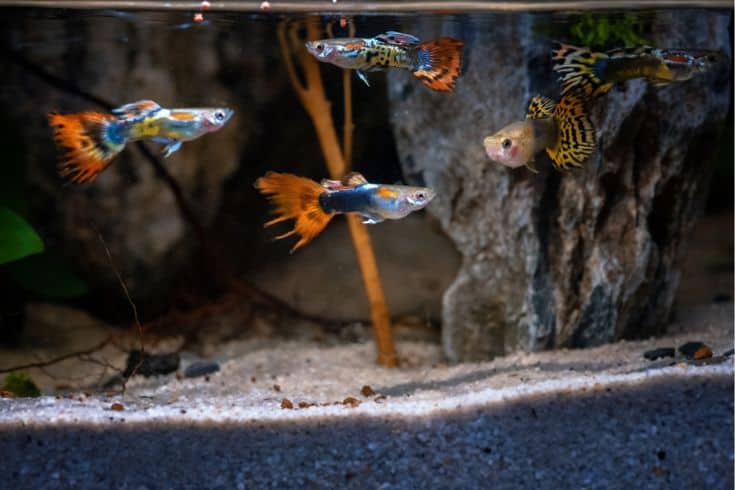When it comes to guppies, one of the most common questions is whether or not they lay eggs. Guppies are a type of freshwater fish that is relatively easy to care for and are a popular choice for aquariums. While guppies do not lay eggs as most other fish species, they still reproduce in an interesting way that involves the male fertilizing the female’s eggs internally.
In this article, we’ll discuss how guppies reproduce and some common phenomena resembling eggs being laid. By the end of the article, you’ll have a better understanding of how your guppy’s reproductive system works!
Do Guppies Lay Eggs?
The short answer to this question is no – guppies do not lay eggs – at least not in the conventional sense. Most fish species lay eggs that are fertilized outside of the mother’s body, with the male and female fish releasing sperm and eggs into the water, where they mix together to form a clutch of fertilized eggs that eventually hatch.
Guppies, however, reproduce through live bearing – meaning that their young develop inside the mother until they are ready to be born. However, there are some scenarios where female guppies appear to lay eggs. We will cover some of these instances below, though it is not the same as a fish egg in most cases.
To sum up, guppies generally do not lay eggs. They give birth to live young, the same way mammals like humans and cats do. Of course, they’re hardly the only livebearers around – other tropical fish, such as mollies, also reproduce in this manner. Let’s take a closer look at how guppies breed, and the rare circumstances in which it seems like guppies lay eggs.
Guppy Breeding Habits

Okay, so we’ve established that guppies usually do not lay eggs. But how exactly do guppies breed? Well, as you might have guessed, the female guppy fish needs to mate with a male guppy in order for the female to become pregnant.
Guppies hit sexual maturity at approximately 8 weeks of age, after which the mating process can begin. The male guppy will approach the female and try to court her, by displaying his colorful fins and tail. If she is receptive, the male will use his pelvic fin (or gonopodium) to insert sperm into the female’s body. This fertilizes the guppy eggs that are already inside her.
The female fish then carries the fertilized eggs inside her until they are ready to be born. As her pregnancy progresses, her gravid spot (which is a darker patch on her underside) will become increasingly visible. This spot gets bigger as the pregnancy progresses. The gestation period for guppies is usually around 28 days, after which time the fry (baby guppies) are born.
How Often Do Guppies Give Birth?
Something rather unique about the guppy’s breeding habits is that guppy moms can give birth up to six times from a single mating encounter. Given that a pregnant guppy can give birth to between 10-120 guppy fry each time, you’re potentially looking at 100 offspring per month, per fish! No wonder guppies have earned themselves a reputation for being prolific breeders!
Of course, not all newborn guppies grow up to be adults – many succumb to predatory tank mates or live in unfavorable conditions. But because guppy moms reproduce at such an impressive rate, the guppy population in a tank can multiply very quickly. As far as tropical fish go, guppies are easy to breed, making them favorites among first-time fish owners.

One important caveat is the need for a balanced population of males and females. Females should absolutely outnumber males to prevent males from becoming too aggressive in their pursuit of female guppies. A good ratio to aim for is one male for every three females. This also maximizes your odds of successful breeding.
Do Guppies Lay Eggs? Rare Circumstances
So do guppies lay eggs in any circumstances at all? Well, yes – kind of. Let’s take a closer look at some of the rare situations in which guppies may seem to lay eggs.
Undeveloped Eggs Are Being Released
Guppy females may at times, appear to be laying eggs when in actuality they are merely releasing undeveloped eggs. This often happens due to stress or poor water conditions. A guppy may be carrying these eggs inside her, but they will never develop into fry. Instead, the female’s body rejects them, turning them into a white, slimy substance that she then expels.
This can happen with female guppies of any age, but it is especially common in stressed fish. Most guppy enthusiasts can attest to a guppy’s need for clear, clean water and a stable environment. This is why a good tank maintenance routine, supported by an effective filter, good heating, and stable water conditions, is so important in keeping guppies healthy and happy.
Another reason why undeveloped eggs may be released is if the guppy has recently been moved, or is dealing with an aggressive tankmate. Stress can come in all shapes and forms, so it’s important to keep an eye on your fish and observe their behavior. Think about what, if any, changes have been made to the tank recently that might be causing stress.
Stillborn Fry Are Mistaken For Eggs
Try as we might, sometimes our efforts to breed guppies may result in stillborn fry. The mortality rate for newborn guppies varies, but tends to be higher if the tank is overcrowded or possesses poor water quality. Pregnant guppies housed in these suboptimal conditions may still give birth to fry, but the fry will not survive.

What this means is that sometimes, what appears to be a guppy laying eggs may actually be a guppy releasing stillborn fry. These stillborn fry may only be a fraction of the size of a normal guppy fry and may look like small white eggs. In reality, they are undeveloped guppies that never made it to the fry stage due to unfortunate circumstances.
To prevent this from happening, make sure to check your water conditions at least once a week and try to keep your guppies in the best possible environment. And if your female guppy has given birth to stillborn fry, please consider placing her in a separate, more suitable environment. This will help her to recuperate and give her a better chance at giving birth to healthy fry in the future.
The Guppy Fry Are Curled Up
Healthy guppies are born not as eggs, but fully formed and swimming. Your fry may only be approximately 1/4 inch in size, but most of the time, you will be able to tell that they are actually fry and not eggs. Not only will they have tiny little black dots in place of their eyes, but they will also be swimming around. Super adorable, and very encouraging to see!
However, if your fry are curled up at birth, they may be mistaken for eggs. Sometimes, guppy fry may be born in a curled-up position and, depending on their size, can look like white eggs. This is usually the result of a difficult or premature birth. Though some fry born in these situations can still survive, they are much more likely to have developmental issues.
To sum things up, healthy guppies don’t lay eggs. If your guppy does release underdeveloped eggs or fry, it may be a sign that something is wrong in the tank. In these cases, you’ll want to consult a professional as soon as possible, and take appropriate steps to create a healthier and more stable environment for your little fish.
FAQs
Do Livebearing Fish Have An Advantage Over Egg Scatterers?
Yes, livebearing fish have an advantage over egg scatterers as they are able to care for and protect their young before they hatch. Fish eggs are often left exposed to predators, and egg scatterers do not have the same opportunity that livebearers do to protect their young.
Livebearing fish also have shorter gestation periods, so they can reproduce faster than egg scatterers. This makes them better suited for environments that are subject to rapid change or have limited resources. Guppies and mollies are known to be excellent livebearing fish and are popular among aquarium owners because of their hardy nature.
The final advantage of livebearing fish is that they can produce larger litters of fry than egg scatterers. This means that you can get more fry from one female guppy or molly, which is great for aquarium hobbyists looking to breed fish. Be that as it may, you should always take into consideration the size of your tank when considering how many fish to raise.
How Long Will It Take For Your Guppy To Give Birth?
Though the gestation period of guppies can vary, most female guppies will usually give birth within a month of conception. The actual process of giving birth or “dropping” fry typically lasts between 4-6 hours. As one might expect, this is a physically demanding process for the mother fish, and can take a toll on her health.
When Do Guppies Reach Sexual Maturity?

Guppies reach sexual maturity between 8-14 weeks, depending on the size and health of the individual fish. Male guppies can reach sexual maturity sooner than female guppies, and they will start to display more aggressive behaviors, such as chasing or nipping at the female guppies in the tank.
The Takeaway
In conclusion, guppies do not typically lay eggs. However, unhealthy female guppies may release undeveloped fry or “eggs” that look like small white eggs. If you notice this happening in your tank, it’s important to take steps to improve the environment for your fish, as unfavorable water conditions can cause this condition.
We hope this article has helped to clarify the question of whether guppies lay eggs! As always, if you have any other questions or concerns about your fish, it’s best to consult a local expert. Good luck with your tank!
